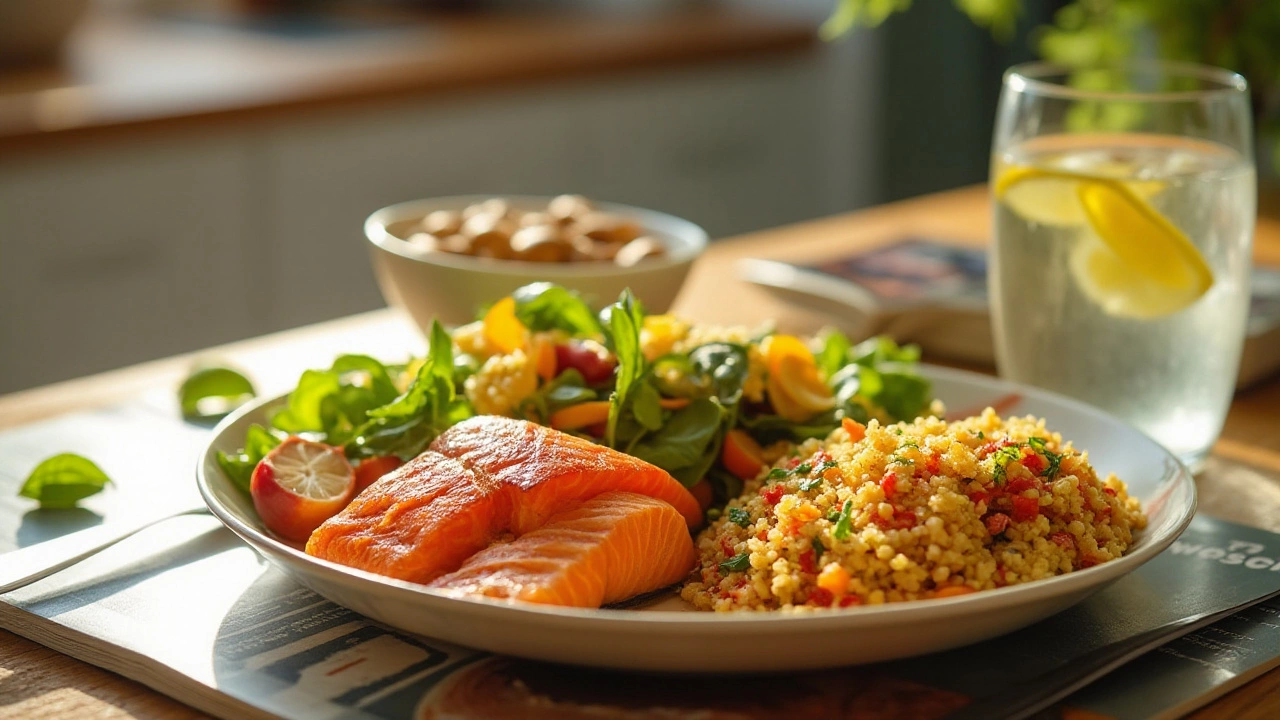Top Foods to Boost Your Fitness Journey

Embarking on a fitness journey is not just about the hours spent sweating it out at the gym. What you eat plays a crucial role in how efficiently your body performs and recovers. With the right foods, you can power your workouts, aid in recovery, and ultimately achieve the results you desire.
Understanding the impact of different nutrients is key. Carbohydrates provide the energy to power through intense sessions, while proteins support muscle repair and growth. Healthy fats are essential for overall well-being and can enhance performance.
Let's explore the foods that should feature prominently on your plate to ensure you stay on top of your game. By the end, you'll know what to eat to keep your body fueled and fit.
- Fueling Your Body: The Role of Carbohydrates
- Protein Powerhouses for Muscle Growth
- Healthy Fats for Optimal Performance
- Incorporating Superfoods into Your Routine
Fueling Your Body: The Role of Carbohydrates
Carbohydrates often find themselves at the center of fitness debates, but their importance in a well-rounded diet is undeniable. When you work out, your muscles need energy, and that's where carbs step in. They're your body's primary source of fuel, particularly during high-intensity endurance training. The moment you lace up your sneakers and hit the track, your body begins to consume the glucose stored in your muscles—known as glycogen.
Understanding the types of carbohydrates is crucial. Simple carbs, found in foods like fruits or honey, are quickly absorbed by the body, making them perfect for a pre-workout snack to give you that instantaneous boost. On the other hand, complex carbohydrates, like whole grains and legumes, take longer to digest, providing a steady flow of energy throughout the day. They prevent those dreaded energy crashes and keep your hunger in check.
Healthy diet enthusiasts often stress balancing these carbohydrates in meals. Instead of refined grains, embrace the wholesome goodness of quinoa, brown rice, or oats. These do wonders not just for your endurance but also support your digestive health. Including carbohydrates with a low glycemic index in your meals can also stabilize your blood sugar levels, minimizing the risk of insulin spikes. This balance will not only enhance workout performance but aids post-exercise recovery significantly.
There's no one-size-fits-all when it comes to carbs. Individual needs vary, based on factors like the intensity of exercise, metabolic rate, and personal goals. For those engaging in endurance sports, some experts recommend consuming 2.5 to 4.5 grams of carbohydrate per pound of body weight each day. Monitoring how your body responds and adjusting intake accordingly can be key to optimized performance.
One fascinating fact is how the timing of carbohydrate consumption can affect performance. Studies have shown that consuming carbohydrates one to three hours before exercise and then within 30 minutes to two hours afterwards can replenish glycogen stores efficiently. This strategy can prepare the body for the next workout session, especially for those engaging in back-to-back training days.
"Consuming carbohydrates in the right amounts and at the right time is essential for peak performance," says Dr. Louise Burke, a sports dietitian renowned for her work with elite athletes.
To sum up, understanding how to fuel your body with the right carbohydrates is pivotal to excelling in your fitness journey. Don't shy away from these essential nutrients. Instead, embrace them as allies in achieving your health and fitness goals.

Protein Powerhouses for Muscle Growth
Diving into your fitness journey, one of the most critical elements to consider is your protein intake. This macronutrient plays an indispensable role in muscle repair and growth, helping you achieve the toned and strong physique you are after. From building new muscle fibers to aiding recovery after an intense workout, protein is the cornerstone of an effective fitness diet. Your muscles undergo tiny tears during exercise, especially with weight training, and protein is required to repair these tears, effectively leading to muscle growth.
Proteins are made up of amino acids, and among them, essential amino acids cannot be produced by the body and must be consumed through diet. This is why incorporating a variety of proteins is so important. Foods like chicken, turkey, and lean cuts of beef or pork offer high-quality proteins filled with essential amino acids. Fish, particularly fatty types like salmon and tuna, not only provide proteins but also add a dose of healthy fats beneficial for overall health. These offer a dual benefit, supporting heart health while also replenishing your body's protein needs.
Dairy products such as Greek yogurt, cottage cheese, and milk are also rich sources of proteins and make it easy to whip up a post-workout snack or refreshment. For those who are lactose intolerant or prefer plant-based options, tofu, beans, lentils, and quinoa are excellent alternatives. Each of these sources offers a different amino acid profile and can cater to various dietary needs. The key is variety and balance in your diet, ensuring you cover all nutritional bases.
"Protein is the one nutrient that we have to be really careful to not underconsume. It is very important not just for muscle but also for numerous functions in the body," says Dr. Sue Radd, a well-known nutritionist.
Not only should you focus on the type of protein, but also the timing of intake plays a crucial role. Many fitness experts suggest spreading protein consumption throughout the day. Consuming proteins after workouts is particularly effective in maximizing muscle repair and growth. A convenient way to incorporate this is by preparing protein shakes or small meals with eggs, which are both quick to prepare and high in quality protein.
Despite the emphasis on high protein intake, it's essential to balance it with other macronutrients such as carbohydrates and fats for optimal fitness results. Consuming all these nutrients in the right proportions contributes to sustained energy levels and improved overall performance. As you continue your fitness journey, keep in mind that healthy diet choices are pivotal in seeing tangible results from your physical efforts.

Healthy Fats for Optimal Performance
In the world of nutrition, healthy fats have emerged as crucial components of a diet geared towards fitness. It's important not to shy away from fats simply because they carry that mysterious word 'fat'. These fats are essential for various bodily functions, including hormone production, cellular health, and even your brain's performance. Adding the right kind of fats to your meals can make a noticeable difference in your energy levels and workout efficiency.
One of the most talked-about sources of healthy fats is the avocado. Avocados are rich in monounsaturated fats, which have been shown to lower bad cholesterol levels and reduce the risk of heart disease. But it's not just about the heart; these fats can also provide a steady energy source. Consuming avocados regularly ensures that your energy levels remain stable, making long, strenuous workouts more manageable and less tiring. Many athletes use avocados in smoothies, on toast, or as part of a salad to take advantage of their nutritional benefits.
Nuts and seeds, such as almonds, walnuts, and flaxseeds, are another fantastic source of healthy fats. They are packed with omega-3 fatty acids, which have anti-inflammatory properties. This means they can aid in reducing the inflammation often associated with intense physical exercise. By consuming these nuts and seeds, athletes can hasten their recovery process and occasionally prevent injuries. Notably, a University of Toronto study highlighted that "including almonds in your diet can help improve heart health as well as aid in muscle recovery."
"The right types of fats are crucial for optimal performance in athletes," says Dr. Jane Smith, a leading nutritionist. "They help in utilizing energy more efficiently and play a role in protecting muscle tissue."
Don't forget about fatty fish like salmon or tuna, which are also excellent for incorporating healthy fats into your diet. These fish are rich in EPA and DHA, types of omega-3 fatty acids that support cardiovascular health and cognitive function. Having fish at least twice a week can ensure that your body has the right balance of fats for efficient performance and brain health. Additionally, these fats contribute to reducing muscle soreness due to their anti-inflammatory effects, making your post-workout recovery less painful and more effective.
Finally, consider the inclusion of oils such as olive oil and coconut oil in your cooking. Olive oil is packed with monounsaturated fats and additional compounds like oleic acid and polyphenols, which are known to decrease inflammation and promote heart health. Coconut oil, on the other hand, contains medium-chain triglycerides that are metabolized quickly, providing a rapid energy source that's perfect for pre-workout consumption. Incorporating these oils in moderation can enable you to reach the peak of your fitness without feeling deprived of flavorful meals.

Incorporating Superfoods into Your Routine
Bringing superfoods into your diet is like inviting little superheroes to fight battles for your health and fitness. These nutrient-packed foods aren't just a trend — they're backed by science for boosting health and enhancing physical performance. Blueberries, for instance, are a popular superfood known for their rich antioxidant content. Studies have shown that they can help combat oxidative stress due to intense exercise, aiding in recovery. They also support heart health which is crucial when engaging in any fitness routine. Simply tossing a handful of blueberries into your morning oatmeal or smoothie can provide an easy start.
Kale, another superstar in the superfoods world, offers a unique blend of vitamins and minerals that are essential for maintaining good health. It's packed with vitamin K, C, and A, and also offers a healthy dose of calcium, which supports bone health — an indispensable factor for anyone striving for fitness longevity. You can mix kale into salads, soups, or blend it into green smoothies with fruits for a balanced nutrient intake. Exploring different recipes can make incorporating kale an enjoyable experience.
Chia seeds, small but mighty, are a powerhouse of dietary fiber and omega-3 fatty acids, both of which play roles in maintaining a healthy heart and digestive system. They also help to keep you feeling full and satisfied, which can be beneficial for weight management. These tiny seeds are versatile and can be sprinkled onto yogurt, mixed into dough for baking, or used to make puddings. Adding them to your meals can enhance not just the flavor but also the nutritional profile.
Another key player in the superfood category is quinoa, a complete protein that contains all nine essential amino acids. This makes it a fantastic option for fitness foods, especially for those on a plant-based diet. It provides the protein needed for muscle repair and growth, important when you're consistently working out. Quinoa is also rich in fiber and minerals like magnesium and iron, contributing to improved energy levels and overall vitality. Including quinoa as a side dish or a salad base can be a delicious way to incorporate this versatile grain.
"Let food be thy medicine, and let medicine be thy food." — Hippocrates
Don't underestimate the power of nuts, particularly almonds and walnuts, which are excellent sources of healthy fats, protein, and antioxidants. These nutritious bites can keep energy levels steady and support brain health. Eating a small handful of nuts daily can provide health benefits and contribute to sustained energy, aiding your fitness journey effectively. You can enjoy them as a snack or add to meals for a crunchy texture.
To seamlessly integrate superfoods into your routine, start small by including one or two new foods each week. This gradual approach not only helps your taste buds adjust but also ensures long-term sustainability in your eating habits. Creating recipes that you enjoy is key, and experimenting can lead to pleasant surprise discoveries in taste and health benefits. Pairing beloved recipes with these powerful foods will not only supercharge your nutrition but also enhance your culinary repertoire.
